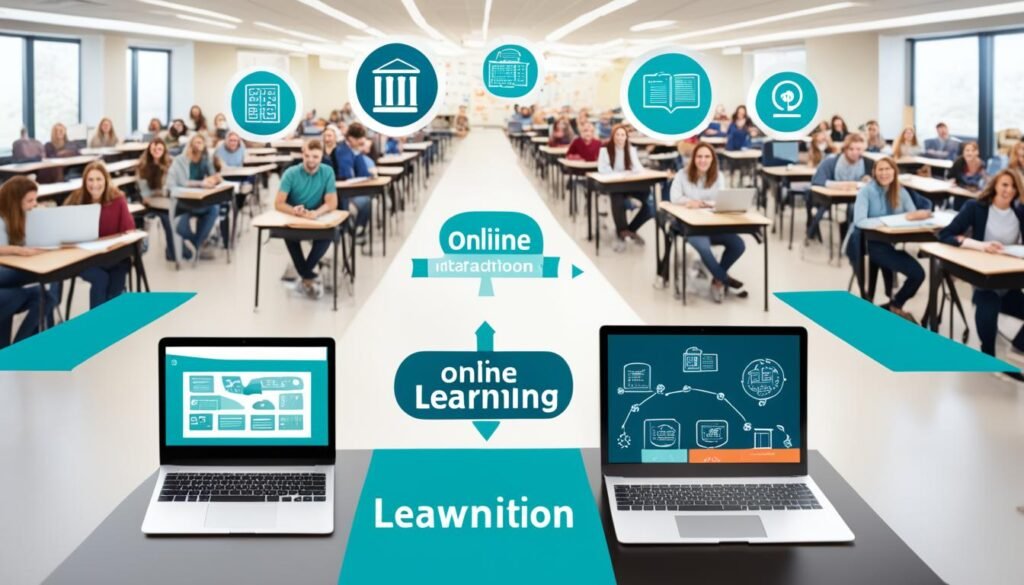Online education has had a significant impact on traditional learning institutions, bringing about a digital transformation in education. The rise of online course platforms has revolutionized the way students learn, introducing blended learning methods that combine online and traditional classroom experiences. In this article, we will explore the implications and effects of online course platforms on traditional education systems.
Also Read: Learn With Ease: Online Courses For Beginners
Key Takeaways:
- Online course platforms have changed the landscape of traditional education systems, leading to a blended learning approach.
- Blended learning combines online and in-person classroom experiences, providing flexibility and personalized learning opportunities.
- Traditional learning institutions face challenges in adapting to the digital landscape and competing with online education.
- Online education has opened up new opportunities for career advancement and professional development.
- While online education offers many advantages, it also presents challenges such as lack of face-to-face interaction and the need for self-motivation and access to technology.
Advantages of Online Education
Online education offers numerous advantages over traditional classroom-based education. One of the main benefits is flexibility. Students have the freedom to create their own study schedules and learn at their own pace. Whether you’re a working professional, a stay-at-home parent, or someone with other commitments, online education allows you to balance your time effectively and fit learning into your busy life.
In addition to flexibility, online education is also affordable. Without the need for physical infrastructure and overhead costs, online courses tend to be more budget-friendly compared to traditional education options. This accessibility allows individuals from various financial backgrounds to pursue their educational goals without the burden of high tuition fees.
Also Read: How Does Chicago State University Student Success?
Furthermore, online education provides access to a wider range of courses. Unlike traditional education, where your options are limited to the courses offered by your local institutions, online platforms give you the opportunity to explore a broader range of subjects and expertise. You can enroll in courses offered by renowned universities, industry experts, or even access niche topics that may not be available in your geographical area.
“Online education allows students to learn at their own pace, provides more flexibility in their schedules, and offers a wider range of courses to choose from.” – John Smith, Education Expert
Overall, the advantages of online education, such as flexibility, affordability, and access to a wider range of courses, make it a compelling choice for individuals seeking to enhance their knowledge and skills.
| Advantages of Online Education | Description |
|---|---|
| Flexibility | Students can study at their own pace and from anywhere in the world. |
| Affordability | Online courses tend to be more budget-friendly compared to traditional education options. |
| Access to a wider range of courses | Students have the opportunity to explore a broader range of subjects and expertise. |
Challenges of Online Education

While online education has its advantages, it also presents challenges that students and institutions must navigate. These challenges can affect students’ learning experience and overall success in online courses.
Also Read: What Are The Requirements For A Bachelor Of Education Degree?
Lack of Face-to-Face Interaction
One of the main challenges of online education is the lack of face-to-face interaction between students and instructors. Without physical presence, students may miss out on the dynamic and engaging discussions that typically occur in a traditional classroom setting. The absence of non-verbal cues and real-time feedback can result in feelings of isolation and hinder collaborative learning opportunities.
Self-Motivation and Discipline
Online learning requires a high level of self-motivation and discipline. Students must take responsibility for managing their time effectively and staying on track with assignments and coursework. Unlike traditional classroom environments with set schedules and regular reminders, online education demands self-directed learning. It can be challenging for some students to stay motivated and focused without the accountability provided by regular face-to-face interactions.
Access to Technology
In order to participate effectively in online courses, students need access to technology. This includes a reliable internet connection and a computer or mobile device. However, not all students have equal access to these resources, leading to inequalities in online education. Limited or unreliable internet connectivity, as well as a lack of access to devices, can hinder students’ ability to fully engage in online learning experiences.
| Challenges of Online Education | Solutions |
|---|---|
| Lack of face-to-face interaction | Encourage active online discussions, virtual group projects, and incorporate video conferencing tools to foster student engagement and interaction. |
| Self-motivation and discipline | Provide clear guidelines, expectations, and regular check-ins to help students stay accountable and motivated. Incorporate interactive elements, such as quizzes and gamified exercises, to maintain student interest. |
| Access to technology | Offer financial assistance programs or loan devices to students in need. Partner with organizations or government initiatives to improve internet access in underserved areas. |
By addressing these challenges, institutions and educators can enhance the online learning experience and ensure that all students have equal opportunities to succeed in their online courses.
Also Read: What Does An Education Specialist Do?
Impact of Online Learning on Student Engagement

Online learning has revolutionized the way students engage with educational content, providing both positive and negative impacts on student engagement. While traditional classrooms offer face-to-face interaction, online learning platforms leverage interactive and multimedia content to captivate and involve students in the virtual environment.
One of the key advantages of online learning is the ability to deliver educational materials in innovative and engaging formats. With interactive and multimedia content, such as videos, simulations, and quizzes, students can interact with the material directly, enhancing their understanding and retention of the subject matter. This immersive approach fosters greater engagement as students actively participate in the learning process.
Online learning platforms offer a wide range of interactive tools and resources that cater to different learning styles and preferences. For visual learners, videos and infographics can provide a dynamic and engaging way to explore new concepts. Meanwhile, interactive quizzes and games can challenge and motivate kinesthetic learners. These diverse options promote active engagement and help students stay focused and interested in their studies.
In addition to interactive content, online learning also facilitates personalized feedback and support, which play a crucial role in student engagement. Through digital platforms and communication tools, instructors can provide individualized feedback, addressing specific areas of improvement and providing guidance for further learning. This tailored approach helps students feel valued and supported, fostering a sense of motivation and involvement in their studies.
Also Read: Lesley University: Discover Your Path In Higher Education
Furthermore, online learning platforms often promote collaborative learning experiences, allowing students to interact with their peers through virtual discussion boards, group projects, and online forums. This social element fosters a sense of community and engagement as students can exchange ideas, ask questions, and learn from each other’s perspectives.
Online Learning and Student Retention
The impact of online learning on student engagement is closely tied to student retention rates. By providing interactive and personalized learning experiences, online learning platforms aim to keep students motivated and invested in their education. This, in turn, increases the likelihood of students persisting and completing their courses or programs.
Research has shown that interactive and multimedia content in online courses can lead to higher levels of student engagement and, consequently, greater retention rates. Students who actively participate in discussion boards, complete interactive exercises, and receive personalized feedback are more likely to stay committed to their studies and achieve successful outcomes.
As online learning continues to evolve, educators are continuously exploring new ways to enhance student engagement. From gamified learning experiences to real-time collaboration tools, the aim is to create dynamic and interactive virtual classrooms that inspire and motivate students to take an active role in their education.
Influence of Online Learning on the Employment Landscape

Online learning has had a transformative impact on the employment landscape, offering individuals unparalleled opportunities to enhance their skills and advance their careers. Through online courses and programs, individuals can acquire in-demand skills and knowledge that make them more employable in today’s competitive job market.
One of the key advantages of online learning is its ability to bridge the skills gap that exists in many industries. Online courses provide a flexible and accessible way for individuals to acquire the specific skills and expertise needed to fill in-demand roles. This helps address the shortage of qualified professionals and ensures that the workforce remains competitive and adaptable.
Increased Access to Education for Underserved Communities
Online learning has also played a crucial role in increasing access to education for underserved communities. Traditional education systems may be limited by geographical barriers, financial constraints, or other factors that prevent individuals from pursuing higher education or career advancement. However, with online learning, individuals from underserved communities can overcome these barriers and gain the knowledge and skills they need to excel in their chosen fields.
“Online learning has provided individuals with the opportunity to pursue education and gain valuable skills, regardless of their location or socioeconomic background.”
Additionally, online learning has opened up new avenues for career advancement and professional development. With the flexibility of online courses, working professionals can engage in continuous learning and upskilling while maintaining their current job responsibilities. This enables individuals to stay competitive in the rapidly evolving job market and seize new career opportunities.
The impact of online learning on the employment landscape cannot be understated. It has created a pathway for individuals to improve their employability, bridge the skills gap, and advance their careers. Moreover, it has empowered underserved communities by providing them with access to education and equal opportunities for professional growth.
Challenges Faced by Traditional Learning Institutions

Traditional learning institutions are confronted with various challenges as they navigate the evolving landscape of education. The emergence of online education has intensified competition, forcing these institutions to find innovative ways to attract and retain students. Furthermore, the changing needs and expectations of students present a continuous challenge, demanding constant adaptation and improvement from traditional institutions.
One of the most prominent challenges faced by traditional learning institutions is the competition from online education. Online course platforms have gained popularity due to their flexibility, accessibility, and affordability. Students now have access to a vast array of online courses, often provided by reputable institutions and industry experts. This competition requires traditional learning institutions to differentiate themselves by offering unique value propositions and opportunities that cannot be easily replicated in the online space.
Another challenge is meeting the changing needs and expectations of students. Today’s students are digital natives who are accustomed to personalized and interactive learning experiences. They expect technology-driven solutions, collaborative learning opportunities, and seamless integration of educational tools. Traditional institutions must invest in digital infrastructure, instructional technologies, and pedagogical approaches that meet these evolving expectations.
“If traditional learning institutions fail to address the changing needs and expectations of students, they risk losing their relevance and appeal.”
Increasing costs of education pose yet another challenge for traditional institutions. As tuition fees rise, students are seeking alternative options that offer better value for their money. Online education often provides more affordable alternatives, allowing students to pursue higher education without the financial burden associated with traditional institutions. To address this challenge, traditional learning institutions must find ways to manage costs and offer competitive tuition rates, while still providing high-quality education.
In summary, traditional learning institutions face significant challenges in the wake of online education. The competition from online course platforms, changing student needs and expectations, and the increasing cost of education all require institutions to adapt, innovate, and differentiate themselves. Only by proactively addressing these challenges can traditional institutions remain relevant and continue to offer valuable educational experiences to students.
The Rise of Online Education

Online education has witnessed a remarkable surge in popularity in recent years, driven by its accessibility and affordability. This rise has also brought forth the emergence of new learning platforms and innovative delivery methods, revolutionizing the education sector as a whole.
Accessibility has been a key factor contributing to the growth of online education. Unlike traditional classrooms, which often have geographic and time constraints, online learning allows individuals to access educational resources and courses from anywhere in the world, at their own convenience. This increased accessibility has opened up opportunities for learners who may have faced challenges in accessing traditional educational institutions.
Affordability is another crucial aspect that has fueled the rise of online education. With online courses, students can avoid the costs associated with commuting, housing, and textbooks, as well as the often steep tuition fees of traditional universities. This cost-effective alternative has made education more accessible to a wider range of individuals, regardless of their financial circumstances.
New Learning Platforms and Delivery Methods
The expansion of online education has brought about the emergence of new learning platforms and delivery methods that cater to different learning styles and preferences. One such platform is the Massive Open Online Course (MOOC), which offers a vast array of courses on diverse subjects, often provided by esteemed institutions and instructors from around the world. MOOCs have given learners the opportunity to delve into a wide range of topics that were previously inaccessible to them.
Blended learning is another innovative delivery method that has gained popularity alongside online education. It combines both online and face-to-face learning experiences, allowing students to benefit from the best of both worlds. This approach integrates the flexibility and convenience of online learning with the valuable interactions and engagement of traditional classroom settings.
Online education has empowered individuals with the opportunity to expand their knowledge and skills in a flexible and affordable manner. With new learning platforms and delivery methods, it has created a transformative shift in the education landscape.
As online education continues to rise in prominence, it is important for traditional learning institutions to adapt and embrace these changes. They must harness the potential of online education to enhance their offerings and meet the evolving needs of students. By embracing new technologies and pedagogical approaches, traditional institutions can remain competitive in a rapidly changing educational landscape.
With the rise of online education, accessibility, affordability, and new learning platforms and delivery methods are transforming the way we learn and acquire knowledge. This shift presents a multitude of opportunities for individuals to pursue their educational aspirations and bridge the gaps in their learning journeys.
Impact of Online Education on Traditional Learning Institutions

The rise of online education has had a profound impact on traditional learning institutions. In order to stay relevant and competitive in the digital landscape, these institutions have had to adapt and invest in new technologies. The rapid growth of online education has forced traditional learning institutions to rethink their teaching methods and offerings in order to meet the changing needs and expectations of students.
Online education has not only presented challenges for traditional learning institutions but has also created opportunities for innovation. Institutions have had to embrace new approaches to teaching and learning, incorporating digital tools and platforms into their curriculum. This has allowed for greater flexibility and accessibility, providing students with a more personalized and interactive educational experience.
Traditional learning institutions must adapt to the digital landscape and invest in new technologies to remain competitive.
One of the key challenges faced by traditional learning institutions is the competition posed by online education. As more students opt for online courses and degrees, traditional institutions have had to find ways to differentiate themselves and offer unique value. This has led to increased collaboration between traditional institutions and online course platforms, as well as the development of blended learning programs that combine online and in-person instruction.
Traditional learning institutions have had to rethink their teaching methods and offerings to meet the changing needs and expectations of students.
Additionally, the impact of online education has driven traditional learning institutions to innovate and explore new ways of delivering education. Institutions are increasingly leveraging online technologies to create engaging and interactive learning experiences. This includes the use of multimedia content, virtual reality, and gamification to enhance student engagement and retention.
Moreover, online education has spurred a culture of continuous improvement and innovation within traditional learning institutions. The need to keep pace with advancements in online education has led to a greater emphasis on research and development. Institutions are actively exploring new teaching methodologies, curriculum designs, and assessment strategies to stay at the forefront of educational innovation.
Benefits of eLearning in Education

eLearning has transformed the education landscape, offering numerous benefits to students and professionals alike. Let’s explore some of the key advantages that eLearning brings to the table.
1. Flexibility
eLearning offers unparalleled flexibility, allowing learners to access educational materials at their own convenience. Whether you’re a working professional with a busy schedule or a student juggling multiple commitments, eLearning allows you to study at your own pace and on your own time. This flexibility enables individuals to seamlessly balance their educational pursuits with other responsibilities.
2. Self-Paced Learning
eLearning empowers learners to progress at their own speed. Unlike traditional classroom-based education, where everyone follows the same timeline, eLearning lets you set your own learning pace. This self-paced approach ensures that you have enough time to grasp complex concepts and reinforce your understanding before moving on. It promotes a deeper level of comprehension and knowledge retention.
3. Collaborative Learning Experience
eLearning platforms facilitate collaborative learning, allowing students and professionals to connect and engage with peers from diverse backgrounds. Through discussion forums, group projects, and virtual classrooms, eLearning creates opportunities for meaningful interactions and knowledge sharing. Collaborative learning enhances critical thinking, problem-solving skills, and fosters a sense of community and support among learners.
“eLearning allows learners to access educational materials at their own convenience, progress at their own speed, and engage with peers from diverse backgrounds.”
eLearning opens up new doors for education, providing individuals with flexible learning opportunities, self-paced study options, and a collaborative learning experience. The benefits of eLearning extend beyond the traditional boundaries of education, empowering learners to enhance their skills, expand their knowledge, and pursue their educational goals.
| Benefits | Description |
|---|---|
| Flexibility | eLearning offers unparalleled flexibility, allowing learners to access educational materials at their own convenience. This flexibility enables individuals to seamlessly balance their educational pursuits with other responsibilities. |
| Self-Paced Learning | eLearning empowers learners to progress at their own speed, ensuring a deeper level of comprehension and knowledge retention. |
| Collaborative Learning Experience | eLearning platforms facilitate collaborative learning, allowing students and professionals to connect and engage with peers from diverse backgrounds. |
Online course marketplaces
Online course marketplaces are platforms where individuals can browse, purchase, and access a wide range of educational courses offered by various instructors or institutions. These marketplaces provide a convenient way for learners to explore diverse topics, ranging from academic subjects to practical skills and hobbies. They often feature user-friendly interfaces, robust search functionalities, and reviews to help learners make informed decisions. Popular examples include Udemy, Coursera, and Skillshare, which host courses on topics such as programming, business, photography, and language learning. Online course marketplaces have democratized access to education, allowing people worldwide to acquire knowledge conveniently from the comfort of their homes.
The best online learning Platforms (Marketplaces)
Determining the “best” online learning platform can depend on individual needs and preferences. However, some highly regarded platforms include Udemy, known for its vast array of courses across diverse subjects and affordability. Coursera offers courses from top universities and institutions, often with certificates. LinkedIn Learning provides professional development courses and is integrated with LinkedIn profiles for networking. Khan Academy offers free educational content, particularly beneficial for K-12 students. Skillshare focuses on creative skills with a subscription model. Ultimately, the best platform for each learner varies based on factors like budget, learning goals, and preferred teaching style.
Standalone Online Course Platforms
Standalone online course platforms are dedicated websites or applications that offer individual courses outside of a larger marketplace. These platforms focus on specific niches or subjects, providing in-depth learning experiences tailored to particular interests. Examples include MasterClass, which features courses taught by renowned experts in various fields like cooking, writing, and filmmaking. Another example is Codecademy, specializing in coding and programming tutorials with interactive exercises. These platforms often offer subscription or one-time payment models and may include features like progress tracking and certificates upon completion, catering to learners seeking specialized knowledge or skill development.
Best online course creator for managing your business
The best online course creator for managing your business depends on specific needs and preferences. Teachable stands out for its user-friendly interface and extensive customization options, allowing businesses to brand their courses seamlessly. Thinkific offers similar features with additional marketing tools and integrations. Kajabi is renowned for its all-in-one platform, providing course creation, website hosting, email marketing, and sales funnel management. Podia is another popular choice, known for its simplicity and excellent customer support. Ultimately, the best platform for managing your business depends on factors like budget, desired features, and the level of support needed for course creation and marketing efforts.
Best online course creation software for selling digital products and memberships
When it comes to selling digital products and memberships, several online course creation software options stand out. Podia is highly regarded for its simplicity and comprehensive features, enabling creators to sell courses, digital downloads, and memberships all in one place. MemberPress offers powerful membership site capabilities integrated with WordPress, providing extensive customization options. Kajabi is known for its all-in-one platform, combining course creation, website hosting, email marketing, and membership management. Teachable also offers membership features alongside course creation tools, with intuitive interface and marketing capabilities. The best choice depends on factors like desired features, budget, and ease of use.
Best online courses platform for building an online school with advanced marketing
For building an online school with advanced marketing capabilities, Thinkific is a top choice. It offers robust course creation tools, customizable branding, and advanced marketing features like email automation and affiliate marketing integration. Kajabi is another excellent option known for its all-in-one platform, providing course creation, website hosting, email marketing, and advanced marketing tools. Teachable offers similar features with a user-friendly interface and marketing integrations. Podia is praised for its simplicity and comprehensive marketing features, making it ideal for creators looking to build an online school with advanced marketing strategies. Ultimately, the best platform depends on specific needs and preferences.
Best Marketplace Online Teaching Platforms
When it comes to the best marketplace online teaching platforms, several options shine. Udemy leads the pack with its extensive library of courses across diverse topics, offering a broad audience reach for instructors. Coursera is renowned for partnering with top universities and institutions to provide high-quality, accredited courses. Skillshare stands out for its focus on creative skills, fostering a vibrant community of learners and instructors. Teachable provides a platform for instructors to create and sell courses independently, offering flexibility and control. Ultimately, the best choice depends on factors like course content, target audience, and desired level of instructor independence.
4 Main Categories of Online Course Hosting
The four main categories of online course hosting are:
- Self-hosted platforms: These allow instructors to host courses on their own website, giving them full control over branding, pricing, and content.
- Marketplace platforms: These are third-party websites where instructors can list and sell their courses alongside others, reaching a wider audience.
- All-in-one platforms: These offer comprehensive solutions, combining course hosting with website building, marketing tools, and payment processing.
- Learning management systems (LMS): These platforms focus on educational institutions and businesses, providing features like course management, student tracking, and assessment tools. Each category offers distinct benefits tailored to different needs and preferences.
Also Read: Top CFP Study Course For Financial Planners
Conclusion
eLearning has revolutionized education, bringing about a transformative impact on traditional learning systems. With its flexible, collaborative, and personalized approach, eLearning has provided learners with a plethora of benefits. The advantages of eLearning include flexibility in terms of study pace and location, as well as increased accessibility to a wider range of courses. However, this digital age of education also presents its fair share of challenges, particularly in terms of student engagement and motivation.
Nevertheless, embracing eLearning is crucial in driving continuous growth in the digital age. By leveraging the benefits and addressing the challenges, eLearning empowers learners worldwide to navigate the ever-changing landscape of education. With its transformative impact, eLearning not only expands opportunities for individuals but also fosters inclusivity, making education more accessible to diverse learners.
In this digital era, where technology continues to advance, eLearning is at the forefront of education’s evolution. Its continuous growth provides learners with the tools and resources necessary to thrive in an ever-changing world. By embracing eLearning, individuals can unlock their full potential and contribute to society in meaningful ways. As we move forward, it is essential for educational institutions and policymakers to adapt and integrate eLearning into traditional education systems to meet the demands of the digital age.
FAQs
Q: How do online course platforms impact traditional education systems?
A: Online course platforms provide a flexible and accessible way for students to learn outside of traditional classroom settings. They offer a wide range of courses and resources that can complement or even replace traditional education methods.
Q: What is the best online course platform available?
A: The best online course platform can vary depending on your specific needs and preferences. Some popular options include Teachable, Udemy, and Thinkific, each offering unique features for course creation and management.
Q: How can I sell my online courses using a course creator?
A: Most course creators come equipped with tools for creating and selling online courses. You can easily upload your course content, set pricing, and use marketing features to promote and sell your courses to a wide audience.
Q: What are the benefits of using an all-in-one online course platform?
A: An all-in-one online course platform offers a comprehensive set of tools for course creation, marketing, and sales in one integrated system. This simplifies the process for course creators and provides a streamlined experience for students.
Q: How do online course platforms help in creating and selling courses?
A: Online course platforms provide intuitive interfaces and tools that make it easy to create course content, set up payment options, and market your courses to a global audience. They help streamline the process of creating and selling courses online.
Q: What are some key features to look for in online course software?
A: When choosing online course software, look for features like course hosting, marketing tools, email marketing integration, course design capabilities, and customer support. These features can enhance your course creation and sales process.
Q: How can online course platforms benefit instructors and learners?
A: Online course platforms offer instructors the opportunity to reach a wider audience and generate passive income by selling their courses online. For learners, these platforms provide access to a variety of courses on diverse topics and flexible learning options.
Source Links
- https://eduadvice.in/educational-news-details/the-impact-of-online-learning-on-traditional-education/5571
- https://elearningindustry.com/transformative-impact-of-elearning-embracing-the-digital-classroom
- https://timesofindia.indiatimes.com/readersblog/ecommercetrends/the-rise-of-online-education-and-its-impact-on-traditional-learning-institutions-52621/





